Older iPhones are still in use despite their age, according to a report on mobile Internet usage, with the original iPhone 3G, and 3GS all highlighted in traffic monitoring research for 2016 that compares the use of Apple devices against other manufacturers in the smartphone market.
The research from analytics firm DeviceAtlas, based on web usage data derived from User Agent strings, found web traffic from Samsung devices "grew significantly" in the fourth quarter of 2016, increasing in a number of major markets by over 2 percent, including the United States at 2.3 percent, and Italy with a 2.7 percent rise.
In the quarter, Samsung declared it had the best fourth quarter performance for the last three years, with sales of other smartphones helping counteract the bad publicity caused by the Note 7 recall fiasco. A Gartner report earlier this month was more pessimistic on the effects of the recall, with shipment estimates for the quarter down 2.9 percent year-on-year.
For the same quarter, the share of web traffic attributed to Apple devices dropped in many markets, including 5 percent in Italy and 3.6 percent in the U.S. Despite the reductions of usage in most markets, Apple's web traffic share did increase in a few, with Japan up 2.2 percent, South Africa up 2 percent, and up 1.7 percent in Canada.
When analyzing graphs for 20 countries selected for the comparison, it is still apparent that Apple is a major force in a number of markets. In Australia, Canada, Japan, Russia, Sweden, the United Kingdom, and the U.S., Apple continues to be a source for a greater amount of web traffic compared to Samsung smartphones
When comparing Android against iOS, Android continues to have a higher market share overall. The data reveals there are 42 countries out of 56 where Android devices generate more web traffic, while iOS traffic is higher in 14 countries.
It is noted that countries with a preference for using iPhones to go online over Android are highly-developed regions, with Japan and Denmark heading up the list, followed by countries including the UK. Canada, Australia, and the United States. On the other end of the scale, Android is seen to be extremely popular in markets with a generally weaker economy, where Android smartphones are bought due to their lower cost.
Older models of the iPhone are still being used in a number of areas, with the report noting their long lifespan and high resale value making them "a better investment than most Android phones." The iPhone 4 and iPhone 4s still has over 3.5 percent of the mobile web traffic share in Russia, with over 2 percent in France and Japan.
The original iPhone, as well as the 3G and 3GS, are still in use in some countries, making up close to 1 percent of mobile web traffic in Sweden, and has a share of around 0.5 percent in France, Japan, Brazil, Germany, and Italy. The iPod Touch is still holding a 0.5 percent share in Canada, with lower percentages detected in Australia, the United Kingdom, and Japan.
DeviceAtlas also examined the popularity of iPhones with a 4-inch screen for web browsing compared to the other sizes of iPhone, in a small number of markets in the last quarter. In some areas, it is noted that web traffic from 4-inch iPhones is close to the popularity of 4.7-inch iPhones, and is the most popular in Russia.
It is noted that web traffic for 5.5-inch Plus models of iPhones is significantly lower than the other two display sizes in many cases. DeviceAtlas suggests that pricing may be more of an important factor than user preferences in this case, due to the high price of plus models compared to the 4-inch versions.
 Malcolm Owen
Malcolm Owen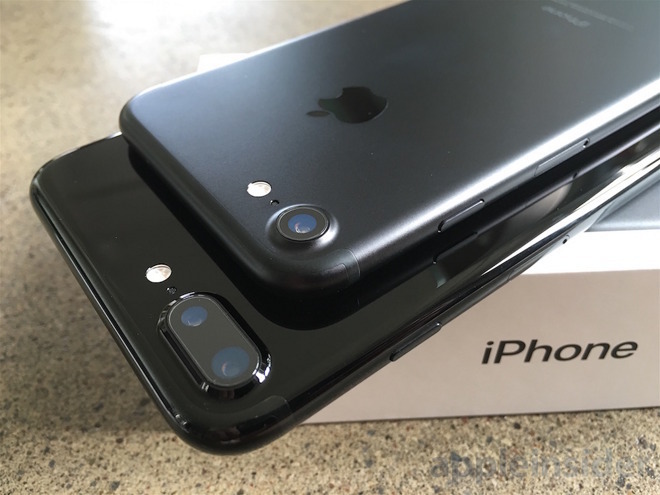
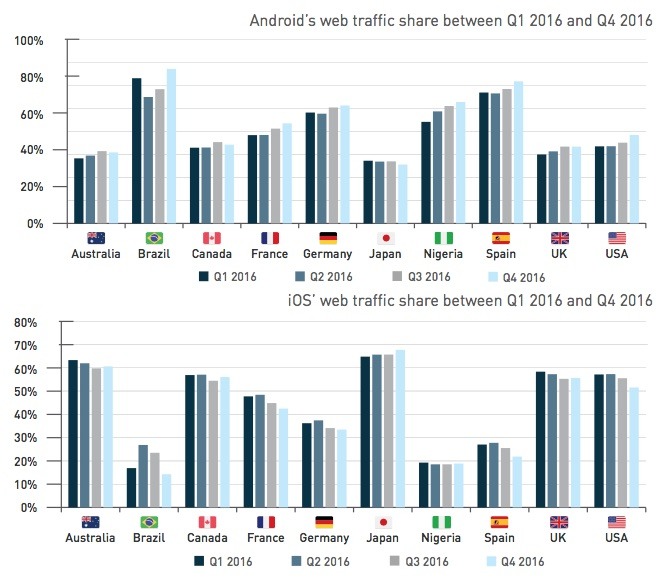
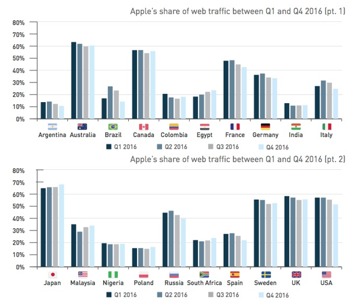
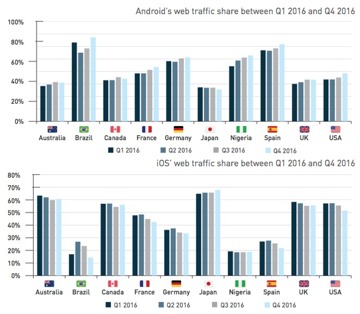
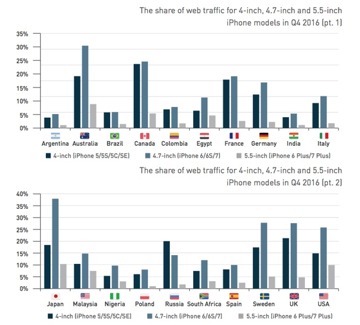
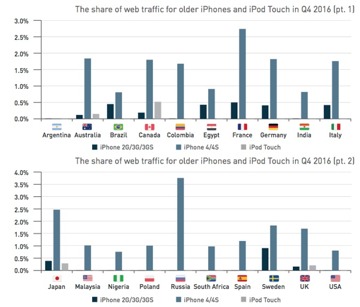
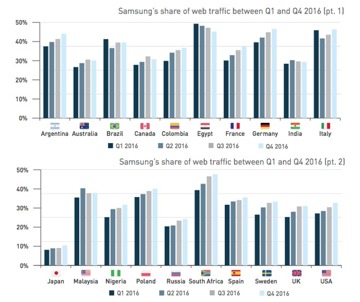







-m.jpg)





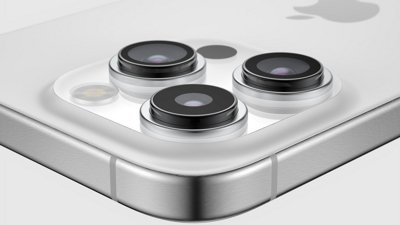

 William Gallagher
William Gallagher
 Andrew O'Hara
Andrew O'Hara

 Sponsored Content
Sponsored Content
 Charles Martin
Charles Martin










17 Comments
Old apple product just do not die, we have a 3G and 3GS as well as a 4 still laying around the house and from time to time I turn them on and they still work fine. Image that, can not say the same for my older android Motorola phone I also have laying about, they barely turn on and die quickly without a charger plugged in.
The only one of my iPhones not still technically working is the iPhone 5 which fell apart due to a swollen battery.
The problem is that a lot of apps just stopped working on the older versions of iOS.
This is what Wall Street really dislikes about Apple. Apple products actually do last a long and useful lifespan. Wall Street prefers companies who make quickly disposable products that constantly need to be replaced. Yeah, sure, an iPhone or iPad replacement cycle is longer and so they start yelling, "No one is buying Apple products anymore. " Of course, Wall Street doesn't give a damn about the ecology. All they want to hear about is Apple being able to sell 200 million iPhones every year. No company needs to sell that many smartphones every year to be considered valuable nor should there be customers having to buy that many every year. So, iPhone growth stagnates because people are holding on to a useful older product and Wall Street says to hell with that. They say it's the iPhone's lack of innovation that's Apple's biggest problem. Such stupidity. Is it that companies shouldn't build products to last?
Even as an Apple shareholder, I believe people should hold on to a useful older product if it still works for them. An iPhone should have a useful life of at least two years. Obviously iPads last longer because they're not used as much. How is that a bad thing? Only greedy investors would think that a long-lasting product is a bad thing for a company to make. All I know is the longer a product can be used, the consumer is getting back more from the cost of purchase. Wall Street only looks at initial cost and nothing else matters.
It's claimed any Android smartphone is just as good as an iPhone but if they're not getting OS upgrades then maybe that could be a problem to users. I can't generalize about the build quality of Android smartphones as some are probably better than others. I just think Apple protects their customers better than most other companies do and that's probably one of the reasons for the higher cost of Apple products. How well does Xiaomi or Huawei support their customers once they're bought the product? Wall Street is never concerned about after-market support because only new sales matters to them. A company needs to support older products to build customer loyalty. I think Apple's retail stores go a long way to provide that customer service but Wall Street never even considers Apple's brick-and-mortar business as being valuable.
Stop listening to analysts and pundits about people not buying iPhones due to lack of innovation. Believe that smart consumers hold on to well-working products for a longer time if they can. Most consumers don't really want to buy some new product every year because it's got a few more features no matter what those tech-heads say. If a consumer is comfortable using an older product, why should they go through the hassle to replace it.
Apple products just keep on going. I just sold my 2010 MBP for almost $400. A 7 yr old laptop. Who expects to get 20% of the cost of the laptop back in 7 yrs (I paid $1,800 for it new).
How many old samsung or other manufacturers phones still around ? Apple has sticky products and people know, why ? Reliable,dependable and long lasting.